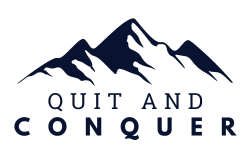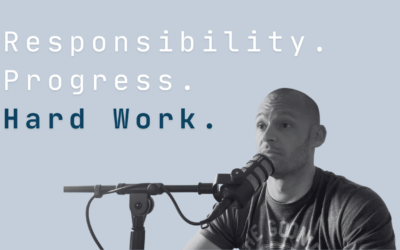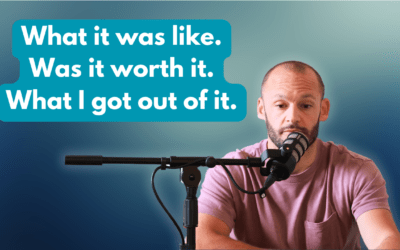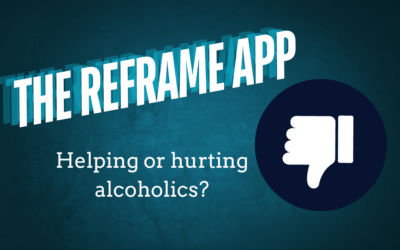They say you need to want it. You can’t do it for someone else; you have to want it for yourself. I heard this a lot when I first decided to change my life and realized that giving up drugs and alcohol for good was my only option. I knew I needed to get clean and sober, but did I want to?
The Problem
I spent a lot of time ruminating on this question during my first couple of weeks in rehab. If I was looking to get clean and sober, and I needed to truly want to give up the drugs and alcohol for good in order to accomplish this, then it followed that I should probably get an answer to this question first before worrying about anything else.
The problem I encountered was simple. Some days I did want to quit; other days I didn’t. The result was me ping-ponging back and forth between knowing that improving my circumstances was possible and trying to accept that this was just the way things would be forever because I still wanted to drink and use drugs. I was getting nowhere and frustrating myself in the process.
This continued until I realized that, maybe, I was approaching this problem all wrong. Addiction itself is defined as the continued desire and compulsion to use a substance or perform a certain behavior despite negative consequences. So I had been all caught up wondering whether or not I wanted to give up drugs and alcohol for good, but of course I didn’t; I was addicted.
Who Would Want To Give It Up?
And, addict or not, there are very few people in this world who never want to have a sip of alcohol or the ability to use some substance. Let’s not pretend like there aren’t any benefits to drinking or using drugs in general. Granted, for many of us, the negative consequences will always outweigh the benefits, but there are benefits.
People use alcohol and other drugs as a means of social lubricant, a short-term way of dealing with stress, a way to cope with loss, a way to improve their mood, etc. And for a healthy individual without a substance abuse problem, this can all work out just fine with little to no damage incurred.
The point is that, when I looked at things this way, I was able to make sense out of my reluctance to give up my ability to drink and use drugs for good. In fact, it made more sense to me that I didn’t want to live a life without substance use than if I did.
So, in the beginning of my recovery, I didn’t want to quit. Not even a little bit. But that was okay, and once I got over this, I was able to focus on coming up with a different solution to my problem. I did this by asking better questions.
Asking The Wrong Questions
I think that, a lot of the time, people have the tendency to ask themselves the wrong questions. Whether it’s the result of us being influenced by other people or the product of our own biases, we often fixate on the wrong part of the problem. The issue with this is that the questions we ask result in the answers we give ourselves. And, in turn, these answers influence the actions we take and the decisions we make.
A simple example of this would be the difference between asking ourselves, “Do I want a snack?” and, “Am I hungry?” If we’re on a diet and looking to lose weight, these two questions can mean the difference between success and failure over a long enough time horizon.
While one concentrates on whether or not we really should have something to eat, the other question fixates on whether or not we want to have a snack. That desire could come from boredom, stress, anxiety, or an array of other feelings we’re having at that moment that aren’t hunger.
The interesting part is that, in the end, regardless of which question we ask ourselves, we’ll justify it all the same after the fact and conclude that we indeed were hungry. We equate the two questions, even though they might have had different answers.
The Takeaway
The key takeaway from this is that taking the right actions and heading in the right direction is often a product of us asking the right questions. By paying more attention to the questions we pose ourselves and the way we frame the situation, we can influence the results and our chances of a beneficial outcome.
So, be skeptical of the questions you pose yourself. Especially when asking the question in a slightly different way might yield a totally different answer. We can often trick ourselves into believing that they are the same, but they rarely ever are.
Applying This Insight To My Own Problem
After realizing that I had been asking myself the wrong questions about whether or not I wanted to live a life in recovery, I was able to ask the right ones. It was simple, and it was effective.
In the beginning, I was conflicted because I knew I had to quit drinking and using drugs. I knew it was slowly destroying my life. Yet, I still didn’t want to live a life where I could never have a drink again. I didn’t want to live a life where I had to go to meetings multiple times a week. I didn’t want to live a life where I felt like an outsider. And when I asked myself the question, “Do you really want to quit?” I equated saying yes to that question with saying yes to all of my former gripes about it.
So I started asking different questions. Did I want to be dependable? Did I want to be honest? Did I want to do more with my life? Was I happy with the person I was becoming? These types of questions I had simple and clear answers to.
The Two Most Important Questions
So now I had a bunch of things I knew I wanted to change about myself. I had a list of clear and unconflicted yesses. I also had this big question of whether or not I wanted to quit. I had reservations on that one. But two simple questions solved this problem for me:
- Did I think that I would be able to make all those life changes if I continued to drink and use drugs?
The answer to that one was assuredly no. I had been trying for years to get it to work and was out of ideas, to say the least. I knew I had to quit.
- Was I willing to make the sacrifice?
Or, framing it a different way, which did I want more? I wanted to be accountable, I wanted to be honest, and I wanted to build some sort of future for myself. I wanted to actually live. I couldn’t have all that and continue to drink and use drugs. I knew that. Now I just had to pick.
The Result
The benefit of all of this was looking past a lot of reservations I had about quitting my substance abuse. I instinctively tied the idea of entering recovery to a bunch of things I initially didn’t want for myself. By focusing on those instead of my desire to create a life built around purpose and meaning, I couldn’t move forward.
The funny thing about a lot of those reservations is that they weren’t even real. Sure, some of them were, and I eventually had to come to terms with them. For instance, accepting the fact that I was never going to have a drink again. But that became easier to swallow as more time passed. I slowly realized that not even that was as big of a deal as I made it out to be.
Others turned out to be total fabrications—things that never deserved my attention to begin with. Like the idea that I was always going to feel like an outsider in social situations. Not true. Or the idea that I was never going to be able to have much fun ever again. Not true.
It was only by focusing on the things that I knew I wanted to change for myself that I was able to look past these details and give myself the time to accept them, formulate new ideas about them, or realize they were entirely false. And here I am, years later. Clean and sober. Happy with the way things panned out.
Conclusion
When I first got into rehab, I thought I needed to wholeheartedly want to quit in order for it to work. I thought I needed to want everything that came alongside that. And I thought I needed to want it every minute of every day. Maybe that’s not what people meant when they talked about my willingness to get clean and sober, but that’s what I got out of it.
What I learned was that it simply wasn’t true. I could be fully committed to recovery without being one hundred percent enthusiastic about everything that came with it. That commitment came from a desire for a better life and a better existence. I came to this realization by focusing on different questions—better questions. By focusing on what mattered most to me, I was able to take steps in the right direction and let the rest fall into place as I went.
So if you’re feeling stuck, if you feel like you can’t move forward because of one reservation or another, try to reframe the situation and give it a look from another vantage point. Ask yourself if you’re focusing on the right things. Ask yourself if you’re willing to make the sacrifice. I was, and it worked.





